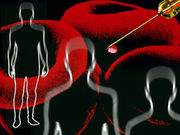Testing is not recommended in most clinical settings; thrombophilia results don’t change management
MONDAY, Nov. 7, 2016 (HealthDay News) — Inpatient assessment for inherited thrombophilia is not recommended, according to a review published in the November issue of the Journal of Hospital Medicine.
Noting that about 7 percent of the population has inherited thrombophilia, which predisposes to an increased risk of venous thromboembolism (VTE), and that patients with inherited thrombophilia have a three- to 20-fold increased relative risk of VTE, Christopher M. Petrilli, M.D., from the University of Michigan in Ann Arbor, and colleagues examined the value of inpatient inherited thrombophilia testing.
The researchers report that the current evidence recommends against testing for inherited thrombophilia in most clinical settings. Thrombophilia results do not change management in patients without a personal history of VTE, as there is no evidence to support thromboprophylaxis in this setting. Inpatient testing is not indicated in patients with a personal history of provoked or unprovoked VTE, as results do not influence management. Furthermore, testing is not cost-effective. A positive result may trigger unnecessary patient anxiety or involvement of consultants. Because many thrombophilia tests are inaccurate in the setting of acute VTE and/or anticoagulation, testing in hospitalized patients has even more limitations.
“Inpatient evaluation for inherited thrombophilia for VTE is not clinically useful, cost-effective, or reliable in the setting of VTE,” the authors write. “The result of such testing does not affect management of acute primary or recurrent VTE.”
Full Text (subscription or payment may be required)
Copyright © 2016 HealthDay. All rights reserved.








